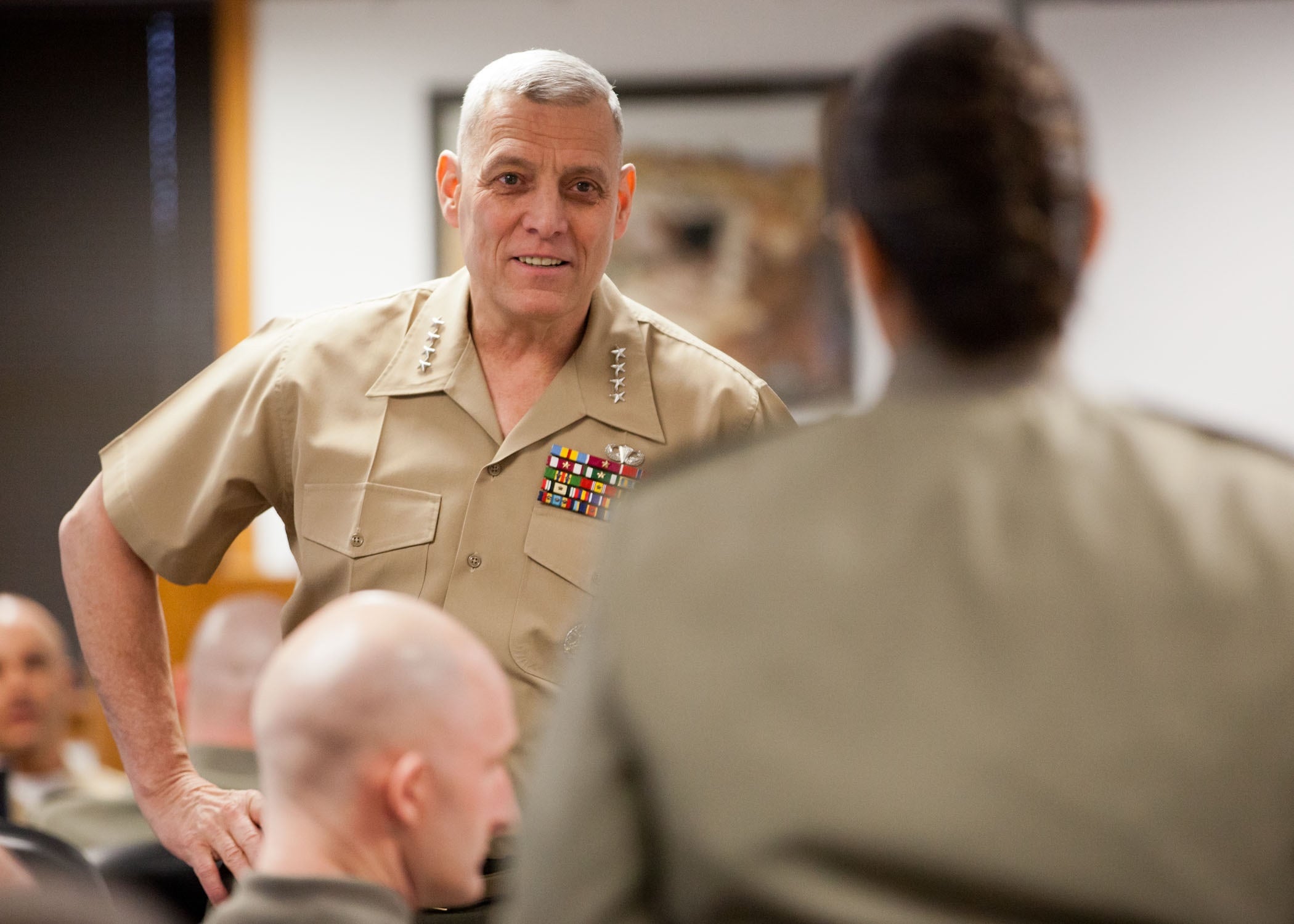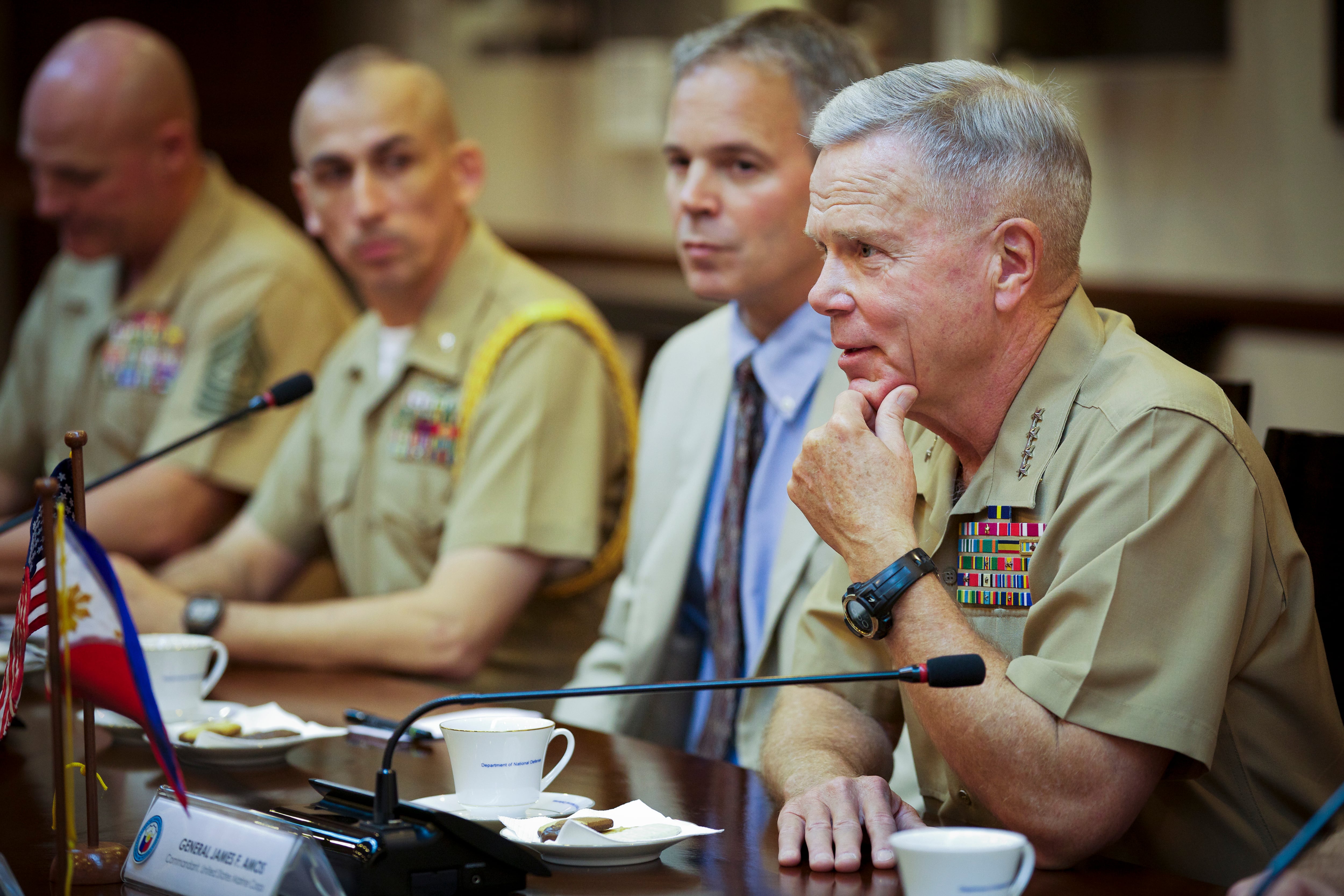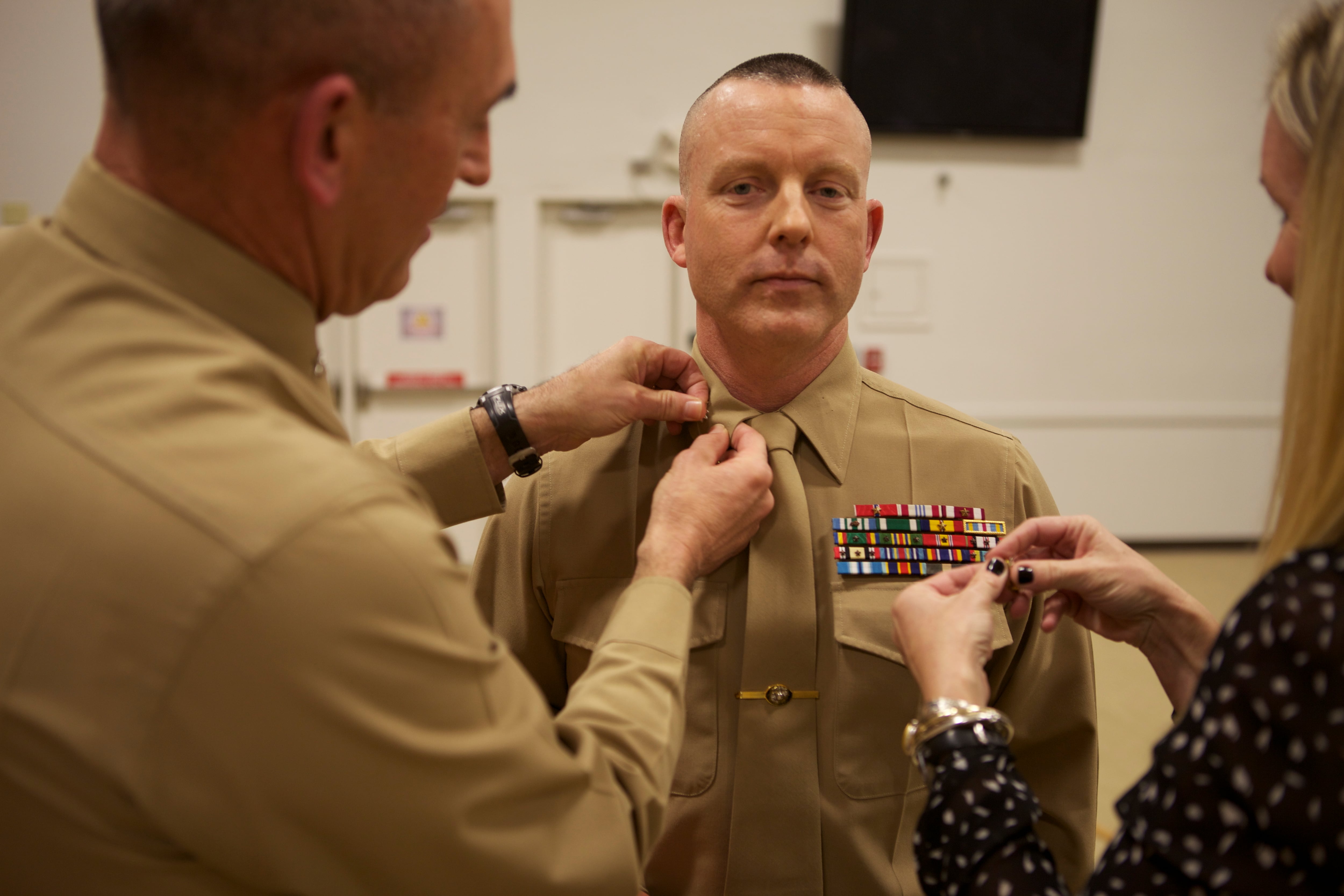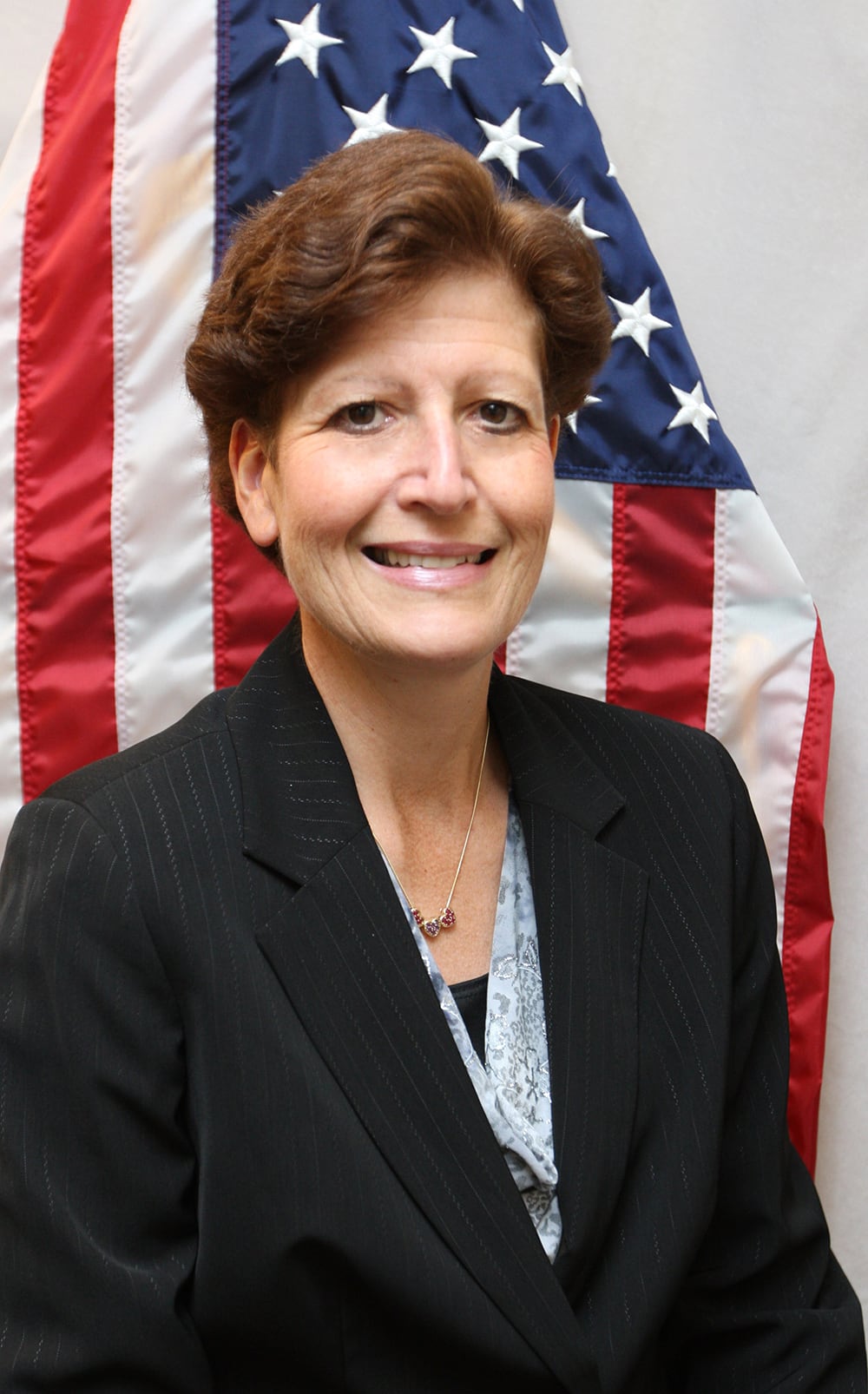Anger, confusion and controversy surrounded the former Marine Corps commandant's decision to approve a promotion for his predecessor's son while troops under the younger officer's command were investigated for war-zone misconduct, but the directive did not amount to preferential treatment, according to a recently unsealed Pentagon investigation.

Lt. Col. James B. Conway, right, presents the unit colors last year to his replacement at 2nd Battalion, 3rd Marines, Lt. Col. Brian P. Coyne. The infantry unit is based in Hawaii. Conway is now stationed in Belgium, at NATO's supreme allied headquarters.
Photo Credit: Kristen Wong/Marine Corps
During a ceremony at Camp Lejeune, North Carolina, on June 1, 2012, Maj. James Brandon Conway was promoted to lieutenant colonel. Looking on proudly as he was pinned with new rank insignia were his mother and his father, the former commandant of the Marine Corps. With his father and mother watching, James Brandon Conway ((did his dad pin the rank on him???)) pinned on the rank of lieutenant colonel June 1, 2012. But for 12 tense hours the day prior to the ceremony, a furor unfolded behind the scenes as at least six of the service's most prominent generals — and perhaps dozens of legal staff and personnel specialists — raced to freeze Conway's promotion only to then scramble again so it could proceed.
Some would question the timing of the younger Conway's promotion and whether it owed to preferential treatment: Despite several unresolved disciplinary matters involving war-zone conduct by troops serving under him - actions that embroiled top Pentagon leadership and the White House in in an international controversy - the pinning ceremony was authorized to proceed by the general who followed his father as the Marine Corps' top officer. The Defense Department Inspector General investigated this flurry of activity as part of a wider whistleblower complaint alleging Gen. James Amos abused his authority as commandant the Marines' top general by endeavoring to dictate the outcome of several legal and administrative matters stemming from a video of four scout snipers urinating on Taliban corpses, an embarrassing incident that embroiled top Pentagon leadership and the Obama administration in an international controversy. At the time of Conway's promotion, much of the resulting disciplinary action was still pending.
Conway, whose father, Gen. James T. Conway, retired as the Marines' commandant in 2010, was never accused of wrongdoing. In fact, there is ample evidence he performed admirably while serving as his infantry's battalion's executive officer, the No. 2 in command, during its deployment to Afghanistan's Helmand province in 2011. Instead, the complaint alleged that Amos ran afoul of military regulations by clearing Conway's promotion even though fellow members of his unit's leadership team were left in career limbo while the urination incident remained unresolved. Pentagon investigators did not substantiate any of the claims made against Amos and called his decision-making in the Conway matter "reasonable" — not favoritism. One of Amos' attorneys would later dismiss the episode as bureaucratic inefficiency run amok.
The inspector general's report was finalized in November 2013 but made public only late last month, after a federal judge in Houston ordered its release. It reveals several previously undisclosed details about the extent to which one field-grade officer's promotion consumed senior Marine Corps officials up and down the East Coast, from Amos and his inner circle at the Pentagon to manpower planners in Quantico, Virginia, and operational commanders at Camp Lejeune. At the same time, the findings raise questions about the thoroughness with which the inspector general's investigators considered evidence during their inquiry. To Amos' harshest critics, the IG's findings are rife with shortcomings and oversights, at best a demonstration of incompetence and at worst a whitewash.
The document was provided to Marine Corps Times by Lee Thweatt, a Houston-area attorney and former Marine judge advocate who sued the Pentagon last year after the IG's office refused to release its findings. In explaining her decision, U.S. Magistrate Judge Frances Stacy cited "waning public trust in Amos during his tenure" as commandant and called suggestions of nepotism at such high levels of the U.S. military "matters of public concern."
Following a distinguished career spanning 42 years, Amos retired from the Marine Corps in December 2014. The handling of the urination incident largely dominated his tenure as the service's top general, eroding his credibility among many rank-and-file Marines who believed he played favorites and put political correctness above his responsibility to ensure the video's perpetrators were treated fairly by the military justice system.
Publicly, Amos has said very little about this ordeal, which stretched from May 2013, when news of the whistleblower complaint first surfaced, until the eve of his retirement ceremony last year. He did not respond to multiple efforts to reach him for this report. Conway, who is stationed at NATO's allied headquarters in Mons, Belgium, declined to comment. A source with knowledge of Conway's situation told Marine Corps Times that the younger Conway never requested assistance from his father or anyone else outside his chain of command, that he doesn't believe the retired commandant weighed in on his son's behalf — and that Brandon Conway remains deeply disappointed about many aspects of the incident and its subsequent fallout.
Gen. Conway, who did phone Amos' attorney to inquire about his son's promotion, has called the nepotism allegations "absolutely BS."
On May 31, the day before Conway's promotion, word surfaced that his parents planned to attend the ceremony. A staff officer in Camp Lejeune's 2nd Marine Division headquarters, where Conway was assigned after returning from Afghanistan, alerted then-Maj. Gen. John Toolan, the division commander. It was 8:30 a.m. There had been "a change from what was expected yesterday," the officer, who is not identified in the inspector general's report, told his boss. He wanted to ensure that Toolan, today a three-star general overseeing Marine Corps Forces Pacific in Hawaii, was aware that "Gen. and Mrs. Conway will be here tomorrow morning for Brandon Conway's promotion."

Gen. John Paxton, now the Marine Corps' assistant commandant, was tasked by Amos with ensuring Marines a 900-man unit remained locked down until it was clear who would face disciplinary action for the urination video.
Photo Credit: Cpl. Tia Dufour/Marine Corps
The matter was escalated to the three-star level an hour later, when a senior assistant to then-Lt. Gen. John Paxton emailed a Marine attorney in the II Marine Expeditionary Force staff judge advocates' office. Neither is identified in the inspector general's report. Paxton, whom Amos made the Marine Corps' assistant commandant in December 2012, was the commanding general of II MEF, the scout snipers' parent command. Amos had ordered Paxton to lock down all personnel moves — including promotions — for the entire 900-person battalion until Paxton provided "comprehensive recommendations" certifying that no troublemakers went overlooked and that none of the unit's leaders were let off the hook if they should be held accountable.
"I said [to Paxton] 'Okay, you verify then, before I let anybody go, or I promote anybody, or we pin a medal on anybody's chest, that they didn't have any part of it, that they didn't know about it,'" Amos told the inspector general's investigators.
As it turns out, Amos did not have the authority to keep Conway on lock-down, the inspector general determined. While the Marine Corps does have a process for delaying an officer's promotion if he is suspected of misconduct or otherwise deemed unqualified to fulfill the next rank's responsibilities, only the Navy secretary can block a promotion once it's been approved by Congress, as it was in Conway's case, the report states. This would have profound consequences for the snipers' battalion commander, then-Lt. Col. Chris Dixon, whose career was improperly derailed for two years as a result of the urination incident.
Today, Dixon is a colonel stationed at Fort Eustis, Virginia, working as the chief of staff for Joint Task Force Civil Support, which oversees the military's first responders for chemical, biological and nuclear incidents. He and Conway remain good friends, according to the source with knowledge of Conway's situation, who suggested Conway felt badly about how his former commander was treated. A spokesperson for the task force did not return messages from Marine Corps Times.
The attorney who worked for Paxton at Camp Lejeune next emailed a counterpart in Quantico, where Lt. Gen. Richard Mills was in charge of handling all legal and administrative matters stemming from the urination incident. Conway's status had come up at least twice before in recent weeks. And each time the response was the same: Mills "does not have an issue with Major Conway's promotion going forward."
Paxton had even met privately with Amos and Mills, three weeks before the Conway promotion kerfuffle, seeking clarity on the commandant's directive. Mills, who retired this past September, indicated then that he intended to punish nine Marines in connection with the urination incident. Neither Conway, who had been chosen to command an infantry battalion in Hawaii, nor Dixon, who had been selected for promotion to colonel and a prestigious assignment at the Justice Department, was among them. Amos told Paxton once more that no Marine would be allowed to move until Paxton outlined everything in writing.
In the afternoon of May 31, Toolan, the 2nd Marine Division commander, reached out to Maj. Gen. Angela Salinas, who led the Marine Corps' manpower management division in Quantico. Toolan seemed worried, she told the inspector general's investigators, because the former commandant was planning to travel to North Carolina for his son's promotion ceremony. Salinas, who has since retired, advised Toolan to loop in Amos' top uniformed attorney, Maj. Gen. Vaughn Ary, who later informed them that the proper procedures had not been followed for delaying Conway's promotion, according to the IG's report. Ary then brought the dilemma to Amos.
"I was livid," Amos told investigators, whose report notes that Amos reportedly told Ary he "did not care" that Conway was the former commandant's son. "I made it very clear to Major General Toolan, ... and I made it very clear to General Paxton that I was not happy because I didn't have [Paxton's written recommendation]. I didn't have that, and you have not come back to me. And you've got no authority to promote Brandon Conway until I have given you the authority."
Ary "took a face shot" from Amos, Salinas told investigators, because apparently no one had followed through on the commandant's orders. She alerted her staff in the promotions branch that Conway's move was likely to be delayed. At 2:30 that afternoon, after conferring with Marine officials in the Pentagon, a staff officer on Salinas' team emailed Camp Lejeune saying the commandant had directed precisely that. But by 5 p.m., after Ary and his staff confirmed Amos did not have the authority to delay Conway's promotion, another email went out from Quantico to Camp Lejeune imploring its recipients to disregard the previous message. The major's promotion was back on.

Robert Hogue, seated beside Amos, spoke with the Marines' former commandant, retired Gen. James T. Conway, about Conway's son promotion. At some point after that phone call, a decision to delay the son's promotion was reversed.
Photo Credit: Sgt. Mallory S. VanderSchans/Marine Corps
At some point during those two and a half hours, the commandant's top civilian lawyer, Robert Hogue, fielded a phone call from Conway's father inquiring about his son's predicament, according to the IG report. Hogue and Gen. Conway had worked closely with one another during Conway's tenure as commandant. The nature of their discussion is completely redacted from the inspector general's report. It says only that Brandon Conway had phoned his parents at some point during the day indicating his promotion "is not going to happen," and that neither Hogue nor Gen. Conway disclosed their discussion to Amos or any other senior leaders "until after Major Conway's promotion."
Amos told investigators that he and Gen. Conway have "never spoken spoken a word about it. ... And I've been in many, many functions with him," he testified. "Both he and his wife. I was at a function with him last Friday night. They have never said a word to me."
Gen. Conway and his wife, Annette, were five hours into their drive from Pennsylvania to North Carolina when their son called, according to the source familiar with Conway's situation. Gen. Conway called Hogue to ask why he had not been given a courtesy call that Brandon Conway was not going to be promoted, the source said. Also, he wanted clarity on the situation. Hogue told him there was confusion about the delay but that Marine Corps headquarters no longer considered the promotion on hold, the source added.

Gen James. T. Conway promoted Amos to four-star general in 2008 upon becoming the Marine Corps assistant commandant. Amos told the inspector general's investigators that he never spoke to his predecessor about Brandon Conway's promotion.
Photo Credit: Lance Cpl. Jacob H. Harrer/Marine Corps
Gen. Conway made the following statement to Marine Corps Times in 2013: "Like so many other aspects of what has been written on this story, that I demanded Major Conway be released from administrative hold is absolutely BS."
With the all-clear to promote Conway, Paxton and his staff worked well into the evening finalizing the general's written recommendations for Amos. He emailed the commandant at 9 p.m., copying Hogue and 10 other generals. Brandon Conway had no contact with the scout snipers or any influence over them, Paxton wrote in explaining his recommendation to release the former commandant's son. Amos approved Paxton's recommendation the following day.
But herein lies an important discrepancy that the inspector general's report does not address. Conway, in fact, had abundant contact with the scout snipers, before and during the deployment.
The sniper platoon was celebrated by Marine officials in theater, racking up some 200 confirmed kills during the battalion's six-month deployment. Dixon, Conway and others in the unit's leadership team had observed them on the battlefield and expressed surprise and dismay at the breakdown in discipline that led to the urination incident, they told the Naval Criminal Investigative Service during its criminal probe. For a time during the deployment, Dixon had given Conway oversight of the Marines' activity in Musa Qala, where the video was made, while Dixon focused on neighboring Now Zad, where the local government and security forces faced several challenges that had to be addressed before the U.S. could give the Afghans full responsibility for the district.

Col. Chris Dixon, seen here during his promotion ceremony, which was delayed two years, now works as the chief of staff for Joint Task Force Civil Support in Fort Eustis, Virginia.
Photo Credit: Lance Cpl. David McKenzie/Marine Corps
Conway received a Bronze Star for his meritorious service as the battalion's executive officer. The medal's citation indicates that "his greatest contribution was his ability to act as the Battalion Commander for extended periods and assume command and control" of Musa Qala, which at the time housed most — more than 65 percent — of the battalion's assets.
Conway told NCIS that while he was unaware the Marines had defiled the Taliban corpses, he had monitored them from an operations center in Musa Qala, not far from the village where the urination incident occurred. Conway also testified that he helped unload the body bags and inspect the insurgents' remains when the snipers returned to their base. He was not in charge of this particular mission, however, according to the source with knowledge of the situation. Dixon was in Musa Qala that day, and both men monitored the operation via radio reports, the source said.
Amos believed someone in charge should be held accountable. He had a mantra, which would become a centerpiece of his platform while serving as commandant: Commanders can delegate their authority, he reasoned, but not their accountability. Amos discussed this thinking with the IG's investigators, according to their report. Command, he said, is "sacred ground" in the Marine Corps. Indeed, during a single three-month stretch after the urination incident, at least six Marine officers were fired from their jobs, in some cases as a consequence of missteps by their subordinates.
Yet in explaining the rationale for freezing Dixon while allowing Conway to be promoted, it is not clear that Amos — though he knew Dixon "took the command element and broke it up" — understood precisely where the urination incident took place, or that Dixon and Conway were together in the Musa Qala operations center as it unfolded.
Nor is it clear the inspector general understood, either.
It was Dixon's battalion, Amos told the investigators — not Conway's. Had Conway been tethered to Dixon "24 hours a day, seven days a week, and they were all wherever [Dixon's] headquarters were, maybe [Conway] would have known more. But had he known, and had [Conway] been there with him, then that would have been a different story. But Brandon was in Busa Kala [sic], and I know that for a fact because I flew in there to visit him."
When asked about his recommendation to release Conway but not Dixon, Paxton offered the IG's investigators a philosophy similar to Amos'. "There is a very subtle but key difference," Paxton told them, "because in [Major Conway's] case, he is the XO. He is not the commander, and there's just a big difference. I mean, because the commander is the one who is ultimately responsible."
Paxton declined to address several detailed questions submitted to him by Marine Corps Times. A spokesman at the Pentagon, Col. Sean Gibson, provided a statement indicating the inspector general's report "verifies the matter was handled fully and openly, in accordance with established processes, and without bias."
"As affirmed by the DOD IG, at no time was any preferential treatment afforded any individual of any grade or unit, to include Major Conway," Gibson's statement says. "Removals from hold status were determined in as timely a manner as possible by general officers at [Camp Lejeune] based solely on evidence available to investigators and intentions of the convening and disposition authority."
Thweatt, who sued the Pentagon in U.S. district court to compel the release of these documents, believes the inspector general "cherry-picked and ignored damning evidence that resulted in a whitewash of what was indisputably unlawful command influence by General Amos."

Attorney Lee Thweatt spent four years in the Marine Corps before leaving active duty for a civilian law career. He became one of Amos' most dogged adversaries.
Photo Credit: Courtesy Lee Thweatt
A plaintiff’s lawyer who focuses on wrongful-death and catastrophic-injury cases, Thweatt spent four years on active duty before leaving the Marine Corps as a captain to pursue a civilian legal career in Houston. He is close friends with James Weirick, the retired Marine attorney whose whistleblower complaint ignited this controversy. Thweatt says his loyalty to Weirick — and above all the law, he said — drove him to become one of Amos' most aggressive adversaries.
They were assigned to the same platoon at Officer Candidates School in Quantico. "The alphabet assignment put his rack next to mine in the squad bay," Thweatt said. "We later worked together as judge advocates and trial counsel in the same office at Camp Pendleton" in southern California. "He was an excellent lawyer with a keen sense of integrity and sharp intellect. He worked weekends a lot to ensure he was always prepared for court. He wanted to be a military judge and was really committed to learning the intricacy of the rules/procedures of the military justice system. ... It sounds idealistic, but it is accurate that he believed, most of all, in hard courtroom fights that were fairly fought — that the facts and the rule of law would and should carry day."
Weirick later alleged that his superiors retaliated against him for contacting members of Congress about his inspector general complaint. The IG did not substantiate that claim either.
For Thweatt, Weirick and others who are intimately — some would say obsessively — connected to the urination cases, there is residual animus, and a strong sense that the Obama administration, and by default the inspector general, allowed Amos to retire without having to fully account for what they insist was a serious breach of public trust and gross abuse of his position. They point to a second IG report, which explores unsubstantiated allegations that Amos tried, unsuccessfully, to ensure the scout snipers were "crushed" for the urination incident. A redacted report was made public a year ago.
As defense attorneys fought to minimize the fallout for those connected to the urination video, they exposed Amos' attempt to influence the general whom he tasked with overseeing their prosecution. That phrase, unlawful command influence, is used to describe even the perceived lack of impartiality during the legal process. The Marine Corps conceded this point in court, but argued that Amos' decision to remove Lt. Gen. Thomas Waldhauser from the cases was a good-faith effort to remedy any harm Amos had done in the process.
"Recall," Thweatt said, "that Amos' [unlawful command influence] was judicially admitted to a military judge in writing by Marine Corps prosecutors assigned with the unenviable task of explaining and minimizing Amos' misconduct. Yet the IG didn't even discuss that striking judicial admission in its report. ... The IG ended up becoming part of the problem instead of part of the solution. Worse, they fought for over a year in federal court to prevent the Freedom of Information Act from shedding light on their reports."
Similarly, the inspector general never addressed the discrepancy between Paxton's conclusion statements that Brandon Conway had no contact with or influence over the scout snipers during the urination incident and Brandon Conway' statements of his actions directly related to the incident.

Marguerite Garrison, one of the Defense Department's deputy inspectors general, oversaw the Amos investigations. "As a rule," she said, "I believe that our investigations are thorough."
Photo Credit: Defense Department
Marguerite Garrison, a retired Army colonel who oversaw the inspector general's work on the Amos investigation, declined to address specific questions about the agency's efforts. She cited longstanding policy that prohibits the IG's office from speaking to the media about individual cases.
For cases such as the one involving Amos — what the IG calls ISOs, or investigations of senior officials — there are typically two investigators, a lead and a backup, she said. That can expand, depending on scope and complexity. During such investigations, Garrison said, interviews last anywhere from one hour to several hours, and the subjects of a complaint are usually interviewed last, once all of the witness testimony has been collected. General officers are allowed to have a lawyer present, often a military judge advocate who is appointed to them.
There are rigorous standards that all investigations must meet before they are approved, Garrison said, and chief among them is objectivity and thoroughness. If there's conflicting testimony, as there was with Amos and Waldhauser, "we will make professional judgments," she added. The IG issues a manual to investigators — "it's kind of like their Bible," she said — and retains a team of lawyers who help to ensure impartiality. That being said, there are instances in which cases must be reopened, and where allegations involving even retired generals have been re-investigated.
"It's so easy to be a Monday morning quarterback and second guess 'well, why didn't you go down this line?' But that's why we have to do re-interviews of folks," Garrison told Marine Corps Times. "... I'm very proud of my organization, and very proud of my investigators, and I think that they do a very good job. And if we do get allegations of misconduct [involving IG personnel], there's a means to investigate things internally."
"As a rule," she added, "I believe that our investigations are thorough."
Garrison's investigators concluded that the Pentagon faced quiet but "intense" political pressure to quickly resolve the urination incident. It had infuriated Afghan President Hamid Karzai and strained relations between the two governments. Karzai urged the American government to "apply the most severe punishment" possible. In response, a White House spokesman conveyed President' Obama's concern, calling the video "unacceptable." But it was then-Defense Secretary Leon Panetta, Navy Secretary Ray Mabus and then-Secretary of State Hillary Clinton who delivered the administration's sharpest public rebuke, including the promise of full accountability.
Behind the scenes, Amos and other senior Marine Corps leaders were well aware of the outside interest in seeing the matter dealt with swiftly, according to the inspector general's report. "The concerns of civilian leadership at the White House included a desire for a quick resolution to the matter," it states.
But that's routine anytime such high-profile incidents occur, a senior Defense Department official intimately familiar with the case told Marine Corps Times. "The White House always — you saw it with San Bernardino: People want answers right now. And of course, investigations take time," the official said, referencing the terror attack Dec. 2 that left 14 dead and 22 wounded after a mass shooting in southern California. The official requested anonymity to discuss the matter freely.
In this regard, there was nothing atypical about the urination incident — "there was no more intensity than the norm," the official said. "When things like this happen, invariably the White House calls and says 'what the hell is going on?'"
By January 2012, when the urination video surfaced, Amos had held two prominent four-star jobs in the Pentagon over a span of three-plus years, much of that time with Barack Obama as the commander in chief. It's not entirely clear how Amos interpreted the White House's intent or its sense of urgency in resolving the urination incident.
While he told the inspector general's investigators that public comments about the urination scandal could be cited by the Marines' defense attorneys as unlawful command influence, Amos nonetheless was embarrassed by the incident and "believed" that he, too, had to release a written statement condemning the video, the report states.
"We're always under pressure to do things that maybe aren't the right things to do," the senior defense official said. "But most of us don't succumb to that pressure. We're paid to not succumb to it."
In the end, eight Marines were punished as a consequence of the urination video. Only one, an officer, was separated from the service involuntarily. Yet the others believed their military careers were indeed crushed, even if they weren't forced out of the Marine Corps. The incident became a stain on their records, stifling their chances of moving up in rank.
"The question becomes how to prevent such abuses of power from ever happening again," Thweatt said. "It starts with a candid discussion of what actually happened, regardless of the ranks or power of those involved. That's why I filed the FOIA lawsuit — because I knew that there was unlawful misconduct and some alarming behavior at the highest levels of the Marine Corps which the IG somehow concluded did not occur. So we had to find out how the IG determined that two plus two equals five."
This episode should be studied, Thweatt concluded, not just by lawyers, but by the military's next generation of enlisted leaders and officers. "Good or bad," he said, "the Marine Corps gets exactly what it trains its Marines for, and permits or encourages them to do. ... We can condemn it retroactively, but with training and professional education, we can prevent it."
View the Defense Department Inspector General's full reports:
